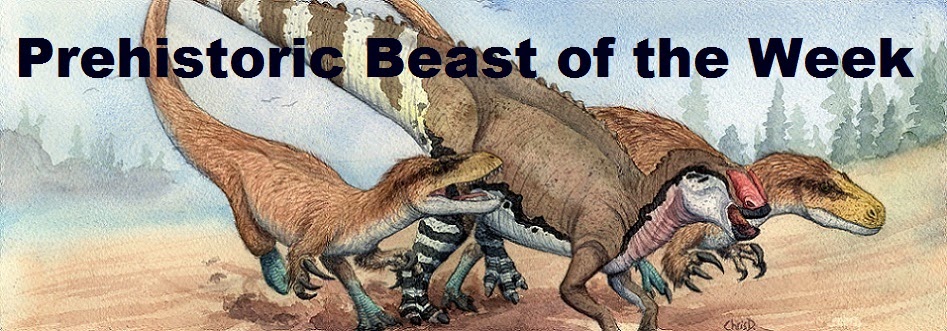Rhinorex was a plant-eating dinosaur that lived in what is now Utah, USA, during the late Cretaceous Period, about 75 million years ago. It was a hadrosaurid, in the same family as other broad-billed duck-billed dinosaurs like Maiasaura, Edmontosurus, and Hadrosaurus. From snout to tail Rhinorex would have measured about 30 feet (9m) long. The genus name, Rhinorex, translates to "Nose king" in reference to this dinosaur's large, down-turned snout. Other hadrosaurs had similarly-shaped snouts, but none as extreme as Rhinorex's. When alive, Rhinorex would have lived nearby other dinosaurs such as Coahuilaceratops, Teratophoneus, and its close relative, Gryposaurus.
 |
| Watercolor life reconstruction of Rhinorex by Christopher DiPiazza |
It's still not clear as to why some hadrosaurs, like Rhinorex, had such downturned snouts. They may have been an adaptation for a specific feeding strategy, or possibly a display for attracting mates or intimidating rivals. It may have even enabled Rhinorex to make certain sounds. Lambiosaurine hadrosaurs like Parasaurolophus, possessed crests that grew from their snouts, but often extended to the tops of their heads for display and sound purposes. It is possible that the lineage Rhinorex was from just applied the strategy in a different direction.
Rhinorex was the only well preserved dinosaur fossil found from its specific area thus far. In addition to it's skull there was also some skin impressions found, which look similar to other known hadrosaur skins; fine pebble-like scales. All other dinosaur fossils in Utah from the same time period were found hundreds of miles away and would have likely been adapted to at least a slightly different kind of habitat. Rhinorex helps fill in gaps previously unknown about Late Cretaceous ecosystems in Utah.
That's all for this week! As always feel free to comment below or on our facebook page! Have a request? Just let me know and I'll make it happen!
References
T.A. Gates & R. Scheetz (2014): A new saurolophine hadrosaurid (Dinosauria: Ornithopoda) from the Campanian of Utah, North America Journal of Systematic Paleontology. doi: 10.1080/14772019.2014.950614
 |
| Reconstruction and photograph of Rhinorex skull. Image from the paper by Terry Gates and Rodney Scheetz. |
Rhinorex was the only well preserved dinosaur fossil found from its specific area thus far. In addition to it's skull there was also some skin impressions found, which look similar to other known hadrosaur skins; fine pebble-like scales. All other dinosaur fossils in Utah from the same time period were found hundreds of miles away and would have likely been adapted to at least a slightly different kind of habitat. Rhinorex helps fill in gaps previously unknown about Late Cretaceous ecosystems in Utah.
That's all for this week! As always feel free to comment below or on our facebook page! Have a request? Just let me know and I'll make it happen!
References
T.A. Gates & R. Scheetz (2014): A new saurolophine hadrosaurid (Dinosauria: Ornithopoda) from the Campanian of Utah, North America Journal of Systematic Paleontology. doi: 10.1080/14772019.2014.950614

No comments:
Post a Comment